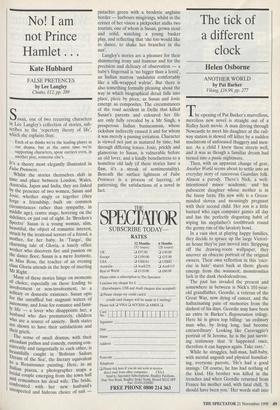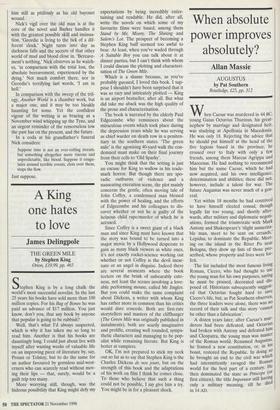The tick of a different clock
Helen Osborne
ANOTHER WORLD by Pat Barker Viking, L16.99, pp. 277 The opening of Pat Barker's marvellous, merciless new novel is straight out of a Ridley Scott movie. A man driving through Newcastle to meet his daughter at the rail- way station is slewed off kilter by a sudden maelstrom of unfocused thuggery and men- ace. As a child I knew these streets well, and it was as though a familiar dream had turned into a panic nightmare.
Then, with an apparent change of gear, Another World seems about to settle into an everyday story of rancorous Guardian folk. Almost a parody. There's Nick, a well- intentioned minor academic, and his pubescent daughter whose mother is in the funny farm. His new wife is a Green- minded sloven and moaningly pregnant with their second child. Her son is a little bastard who zaps computer games all day and has the perfectly disgusting habit of wiping his stepfather's toothbrush round the germy rim of the lavatory bowl.
In a vain shot at playing happy families, they decide to spruce up the large Victori- an house they've just moved into. Stripping off the drawing-room wallpaper, they uncover an obscene portrait of the original owners. Their own reflection in this 'exer- cise in hate' stares back at them: ghosts emerge from the wainscot; monstrosities lurk in the dank rhododendrons.
The past has invaded the present and somewhere in between is Nick's 101-year- old grandfather, Geordie, a veteran of the Great War, now dying of cancer, and the hallucinating pain of memories from the darkest of his days. Geordie may have been an extra in Barker's Regeneration trilogy. Here he is given top billing: 'an ordinary man who, by living long, had become extraordinary'. Looking like Caravaggio's portrait of St Jerome, he is the just surviv- ing testimony that 'it happened once, therefore it can happen again. Take care.'
While he struggles, half-man, half-baby, with mental anguish and physical humiliat- ing, everyone parrots, 'He's had a good innings.' Of course, he has had nothing of the kind. His brother was killed in the trenches and when Geordie returned from France his mother said, with fatal chill, 'It should have been you.' Her words stab into him still as pitilessly as his old bayonet wound.
Nick's vigil over the old man is at the core of the novel and Barker handles it with the greatest possible skill and insinua- tion. 'Geordie is living to the tick of a dif- ferent clock.' Night turns into day as darkness falls and the secrets of that other world of mud and blood close in. 'Bereave- ment's nothing,' Nick observes as he watch- es, 'in comparison with the total loss, the absolute bereavement, experienced by the dying.' Not much comfort there, nor in Geordie's terrifying last words, 'I am in hell.'
In comparison with the sweep of the tril- ogy, Another World is a chamber work, but a major one, and it may be too bleakly haunting for some. Yet the confident vigour of the writing is as bracing as a November wind whipping up the Tyne, and an urgent reminder of the remorseless tow the past has on the present, and the future.
In a coda at his grandfather's funeral Nick considers:
Suppose time is not an ever-rolling stream, but something altogether more viscous and unpredictable, like blood. Suppose it coagu- lates around terrible events, clots over them, stops the flow.
Just suppose.



















































































 Previous page
Previous page